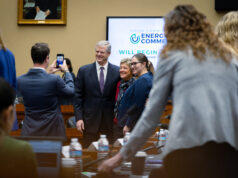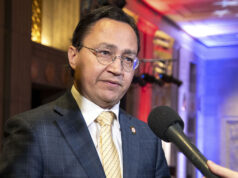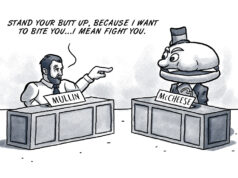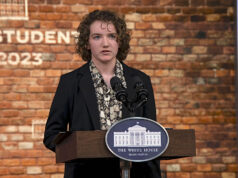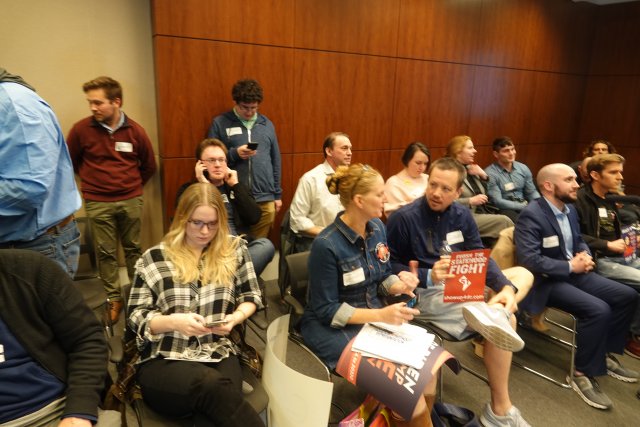

WASHINGTON — For the first time in the history of the Iowa Caucus, Iowans across the country and around the globe were able to openly stand for their candidate outside of the Hawkeye State in a satellite caucus.
In Washington, D.C., that meant voters, who were overwhelmed by journalists and observers, gathered in a basement of a convention hotel to stand with their candidates.
This story was reported by Gaylord News, a Washington reporting project of the Gaylord College of Journalism and Mass Communication at the University of Oklahoma.
Sen. Elizabeth Warren (D-MA) eventually won, as she had 42 out 100 attendees support her. Pete Buttigieg finished second with 23 votes, followed by former Vice President Joe Biden with 20, and ending with Sen. Bernie Sanders (D-VT) meeting the threshold at 15 votes. That meant little to the state Democratic organization that failed to report the results on Monday night.
By Tuesday night, Pete Buttigieg, mayor of South Bend, Indiana, narrowly led Sanders in delegate counts.
Washington Caucus ‘a very good idea’
Still, Iowans in Washington believe the state’s decision to host satellite caucuses were correct. The Washington Caucus was one of 87 satellite locations around the world.
“I think it’s a very good idea. Four years ago, I was out here in D.C. for work and I couldn’t caucus, now I am again and I can,” said Mike Kelly, a veteran who served in Iraq and completed training at Fort Sill, Oklahoma.
Candice Frost came into the caucus undecided, but knew her two most important issues were national security and the economy. She also celebrated the inclusion of Iowans outside of the state’s borders.
“I am a military member. I’ve wanted to caucus for two decades, and I’m very happy Iowa made this decision to allow caucus-goers to participate from various regions. It’s awesome that they changed the rule,” Frost said.
Additionally, she felt the move would make participation more accessible for other logistical reasons.
“I felt it was cost prohibitive to fly back on the same weekend as everyone else to the same small airport in the Midwest to vote,” Frost said.
Two Iowans attending Georgetown University, Maya Shawn and Anushree Lamsal, were able to participate in their first caucus after initially thinking they would be left out.
“I was very sad at first because I’m a Georgetown student. I thought I wouldn’t be able to caucus because I would have to go back home, but then they introduced these sites so it was really exciting,” said Lamsal, who studies international politics.
Shawn felt grateful to participate in her first election.
“I think it’s really cool. When I was younger, I went to the caucus to watch my parents, so it’s really cool to participate in the process now that I’m older,” said Shawn, a Georgetown biology major.
Since this was the first time satellite locations were allowed, there was some uncertainty on how the process would actually unfold.
“So far, it’s been really interesting. We had no idea what to expect when we signed up for this,” said Kelli Harrison of the Linn County Democrats and State Central Committee of Iowa.
Media escorted out of Washington Caucus
Other caucus locations, both in Iowa and around the country, allowed for the media to stay and witness the event actually unfold, but in Washington, the media was escorted out as the participants prepared to make their decisions.
“I feel like, personally, that would be like taking a camera in a ballot box. I don’t want anybody being intimidated by anybody, because with a camera, what if someone is a little bit shy or more moderate and now you have people yelling at them to come over here, then they’re tearing at their decision,” Harrison said.
Others felt that it was part of the caucus experience to put yourself on display for who you support.
“I think you should openly stand behind where you’re going,” Frost said.
The nation will shift its focus to New Hampshire for their primaries on Feb. 11.










